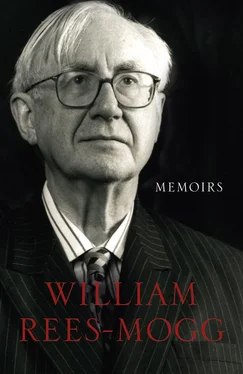As a young child I had a recurrent dream. I am travelling up a shaft, which has ribs. When I reach the top of the shaft, there is a light, and there are large people, giants. They assist me to emerge from the shaft. I awake, feeling that I have passed through a crisis. I am by no means the only person to record such a dream, which is sometimes explained as recalling the birth trauma, and sometimes as a near-death experience.
My mother, Beatrice Warren, born in Mamaroneck, New York, in 1892, was an Irish-American Roman Catholic and a successful Shakespearian actress. All four of her grandparents had emigrated to the United States from Ireland in the 1850s; both her grandfathers then fought for the North in the Civil War. They came from the Irish Catholic middle class, ‘lace-curtain’ rather than ‘bog-trotting’ Irish. They had experienced the famine but survived it. My mother was the eldest child of her family, and for seven years had been an only child.
I have a very vivid picture of her childhood. In the 1890s she had the regular morning treat of being driven to Mamaroneck station with her father, where he caught the commuter train into Grand Central Station. They were driven in the carriage by Arthur Cuffey, the black coachman and handyman. At that time they lived on Union Avenue, though her father later built Shoreacres, a beautiful early twentieth-century house which looks out over Long Island Sound. Her evening treat was to take the same drive to meet the evening train. They had a good quality carriage horse, called Miss Gedney, whom her father had bought from a man in White Plains.
My mother’s father, Daniel Warren, started his working life as a clerk at Harrison Station, which, as every Westchester commuter knows, is the stop between Mamaroneck and Rye. He had been known as a bright lad. His father, old Mr Warren, had prospered as an immigrant and had risen to be a line manager of the New York, New Haven and Hartford Railroad. He got his sixteen-year-old son the job on the railroad.
One morning in 1881, Daniel was standing on the platform where the train to New York was about to arrive. A regular business commuter, Mr Eddy of Coombs, Crosby and Eddy, was standing beside him. Mr Eddy had a fainting fit, and started to totter. As he fell forward, Daniel grabbed him; the locomotive brushed Daniel’s arm as it passed. Mr Eddy thanked Daniel for saving his life, gave him his card and asked him to call on him at his office in Wall Street. When he did so, Daniel was offered a job, rejected a flattering counter-offer by the railroad, and worked for Coombs, Crosby and Eddy, later merged into the American Trading Company, until he retired in the 1920s. He ended his career as the vice-president, which then meant that he was the executive running the business. The American Trading Company, with a strong Japanese connection and branches in many countries, became a powerful international trading house. J. P. Morgan, whom Daniel greatly admired, invited him to join his new club, the Metropolitan. Daniel replied: ‘Mr Morgan, I am flattered by your invitation. I greatly appreciate doing business with you. But I am an Irish Catholic. I do not belong to the same society as you do.’ Nevertheless, the American Trading Company was chosen to advise the Morgan Bank when, in the early 1900s, Morgans wanted to expand into Japanese finance.
In 1888, he made a trip through northern Mexico with eight large trunks of manufacturing samples. At the end of the Mexican National Railroad at Saltillo, he had to hire mules to carry these trunks over the mountains, which were overrun with bandits and outlaws. He remembered hiding behind a wall with a Mexican friend; some shooting was going on. His friend asked him what passport he carried; he replied ‘American’. The Mexican advised him, ‘Do not say “ Americano ”, say “ Ingles ”. They shoot Yankees; they do not dare shoot the “ Ingles ”.’ Such, in the high Victorian period, was the reputation of the British Empire, or perhaps just the Mexican dislike of Yankees. Daniel Warren, though his Irish ancestors had been nationalists, was an Anglophile.
He used to discuss the day-to-day problems of his business with my mother. She particularly remembered the panic of 1907. Wall Street was only saved by the rapid action of J. P. Morgan and a syndicate he formed. Her father acted swiftly and managed to save the American Trading Company, but many other firms went under. The family took their usual summer holiday in the Adirondacks, in upper New York State, and Daniel walked with Beatrice, then fifteen, and talked himself through the stress of the panic.
My mother had been enormously influenced by her relationship with her father whom she very much admired and whom she very well understood; she thereby created for me another role model. Indeed, although I never met him – he died in 1931 and he did not come to England in my lifetime – in some respects I was more influenced by Daniel Warren than by my father. In particular my interest in business and politics comes from my American side.
From a very early age, Beatrice knew that she wanted to be an actress. She could remember, as a child of seven, joining the recitations, which formed part of evening entertainment in the age before radio or television existed. Her party piece was a sentimental poem which ended with the lines:
Thanks to the sunshine, Thanks to the rain, Little white lily is happy again.
While she was at college, Beatrice told her father she wanted to go on the stage. A hundred years ago that was an unusual ambition for a well-brought-up American girl from a family of rising prosperity. Daniel replied that he would support her going on the stage, so long as she earned her own living for a year in some other way. She accepted that, and always regarded it as a sensible condition for him to have set. She taught elocution at Wadleigh High School for a year, commuting from Mamaroneck and getting off at the 116th Street Station. She could remember teaching girls who pronounced ‘th’ as ‘d’ – ‘dis and dat and dese and dose and dem’.
In 1914, Beatrice went on the stage. She was given an introduction, by Granville Barker, to Margaret Anglin, who was casting for a season of Greek plays, translated by Gilbert Murray, in the Greek Theatre at Berkeley, California. Beatrice became a member of the chorus. Alfred Lunt was also a trainee, carrying a spear among the guards. He and his wife, Lynn Fontanne, were to become the leading couple of the American theatre before the Second World War. Beatrice remained with Miss Anglin’s company for a couple of years. In 1916 she was playing the second lead in the Chicago opening of Somerset Maugham’s Caroline , later retitled as Home and Beauty . The author, a friendly but rather shy figure, was sitting in the stalls at the dress rehearsal.
One member of the New York artistic set was Putzi Hanfstaengl, an ardent young German nationalist. He was a son of the family of Munich art dealers, and had been sent to New York to set up a local branch of the firm. They already had a branch in Pall Mall, in London. Putzi gave Beatrice a couple of the firm’s celebrated reproductions, Dürer’s rabbit and Holbein’s drawing of Sir Thomas More, which is now hanging on our drawing-room wall. He argued heatedly in favour of Germany’s historic role as the dominant power in Europe. This would have been in 1915. Beatrice did not like Putzi, though she found his intellectual range interesting. During the Second World War she remembered these conversations, and believed that German imperialism was deeply rooted, that there was a continuity between the imperialism of Kaiser’s Germany and that of Hitler’s. Beatrice’s unfavourable view of Hanfstaengl’s personality was shared by Adolf Hitler, who had employed him in the 1920s and early 1930s as his foreign press secretary. Whereas Beatrice found Hanfstaengl’s German imperialism particularly offensive, Hitler was offended by his greedy habit of taking food off other people’s plates when eating in restaurants.
Читать дальше












